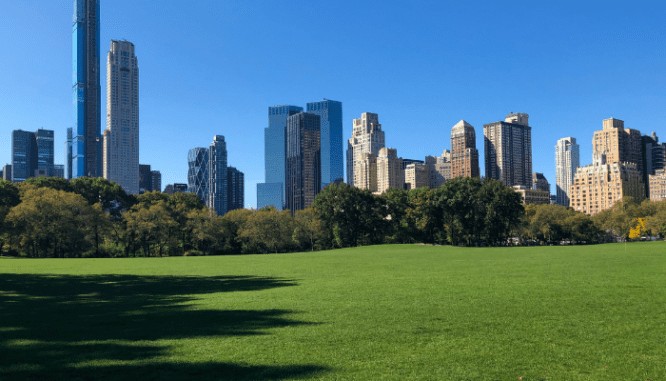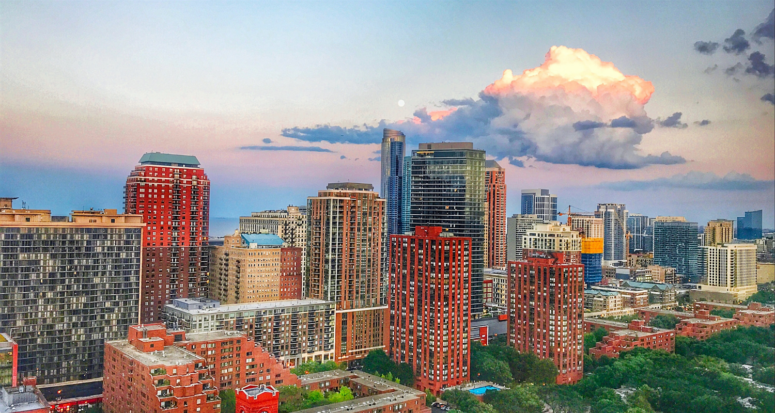26 Benefits of City Living (Including a Few You Probably Never Considered!)
- Published on
- 7 min read
-
Sandy John Contributing AuthorCloseSandy John Contributing Author
Sandy John is a freelance writer and editor who specializes in real estate, homeownership, and personal finance articles. Previously the real estate editor for The Atlanta-Journal Constitution, her byline has appeared in several national and regional publications. Sandy has purchased homes in four cities and she has lost track of how many DIY home-improvement projects she’s done.
If you’re like most of us, you’ve daydreamed about living in a big city at some point, even if you were simply inspired by watching an episode of Friends. Cool loft apartment. Coffee shop on the corner. Museums and nightlife just a quick walk from your door. All those features are part of the appeal of city living — but city dwellers find there are many more benefits of city living, some of them hidden.
We’ve spoken to long-time city residents and a big city real estate agent and looked over dozens of studies and reports to find the benefits of city living. Some of the advantages are obvious, but others may surprise you! So whether you’re thinking about moving to a large metropolis or just want more fodder for daydreams, read on to explore the many benefits of living in a big city.
You’ve got some pretty diverse, amazing neighborhoods throughout the city.
 Ryan Stawasz Real Estate AgentClose
Ryan Stawasz Real Estate AgentClose Ryan Stawasz Real Estate Agent at Keller Williams
Ryan Stawasz Real Estate Agent at Keller Williams
- Years of Experience 10
- Transactions 222
- Average Price Point $387k
- Single Family Homes 157
1. So many housing options!
Housing options in the city run the gamut in price, style, and size. The price per square foot is likely higher than in the suburbs. In San Francisco, for instance, you might pay more than $800 per square foot, compared with the estimated national median price of $123 per square foot. The higher price per square foot means you’ll end up with a much smaller place than you’d get outside the city for the same amount of money.
But cities make up for the price with variety. In Philadelphia, housing ranges from 400-year-old houses to new construction, says Ryan Stawasz, who has completed 26% more sales than the average agent in Philadelphia. City dwellers can choose from row houses, brownstones, converted lofts, condos, and neighborhoods of single-family homes that almost feel suburban. “You’ve got some pretty diverse, amazing neighborhoods throughout the city,” he says.
The tradeoff is that you likely end up with a smaller home and little to no yard — but city dwellers usually aren’t looking for land, anyway, he adds.
2. Proximity to public transportation
Many cities have bus and train systems that take millions of workers to their jobs each day. U.S. News reported that before the pandemic, city residents took 34 million trips daily on public transportation. In Chicago, nearly 30% of commuters take advantage of this benefit, and in New York City, 59% of commuters use public transport.
Benefits of public transportation include giving up the stress of driving in traffic and being able to use your commute time to watch videos, read, or even snooze.
With public transportation nearby, you may find you don’t need a car unless you’re reverse-commuting to a job outside the city, says Stawasz, who has clients who seek out city neighborhoods where they can go car-free.
3. You can give up your car
Going without a car might be a bigger benefit than you realize. The AAA finds that owning a new car costs you nearly $10,000 a year. That’s a lot of subway tokens!
Part of the cost in the AAA estimate is based on the depreciation a new car experiences, but it also includes fuel costs, which the organization figured at about 11 cents per mile, and maintenance and repair, which cost around 10 cents per mile.
You may also have to pay for parking and garage space in a city, so you save even more when you give up car-ownership.
4. Shorter commutes
When you have access to public transportation, you also have access to thousands of jobs within a short commute. In Washington, D.C., for instance, more than 650,000 jobs are accessible within a 30-minute commute on the Metro system, according to U.S. News.
And with all the housing options a big city offers, you can probably find housing closer to your job than you can in a suburban area.

5. Amenities everywhere
Think of cities, and what comes to mind? Theaters, major league sports, museums, concerts, and more.
Big cities are filled with amenities that small towns can’t offer. With big populations, cities can support a wide range of entertainment and cultural venues, which in turn means that city residents have their pick of amenities to match any interest.
6. Events and cultural activities
Of course, you can visit a city to experience a festival or cultural event, but if you live in a big city, there may be a festival nearly every week in one neighborhood or another.
For instance, New Orleans, which topped the Travel + Leisure list of America’s Best Cities for Festivals, has events ranging from the famous (Mardi Gras and the Jazz Festival) to an event celebrating the po-boy sandwich.
Other festival-obsessed cities on the list include Denver, Los Angeles, Atlanta, and Washington, D.C.
7. Wider job opportunities
People have always moved to cities for job opportunities, and the trend is likely to continue. A 2019 study found that the 25 most prosperous U.S. cities are likely to see the most job growth in the future, while rural areas will lose jobs.
In Philadelphia, a multitude of jobs in higher education and health care (or “eds and meds,” in Stawasz’s words) draw doctors, nurses, and educators.
Large companies, such as those on the Fortune 500, tend to be based in cities and have a significant number of jobs there. For example, major employers in Atlanta include Home Depot, United Parcel Service, and Coca-Cola, all Fortune 500 companies with headquarters in the ATL.
8. Less time spent on home maintenance
When you own a smaller home, there’s simply less to take care of. And if you live in a multifamily building, as city dwellers frequently do, you may not be responsible for the exterior maintenance at all!
With smaller square footage, you don’t need to devote as much time to cleaning and upkeep. With less space, you may also be less tempted to buy a lot of stuff you don’t really have room for, so you have money for other things.
The benefits are more free time and lower expenditures on upkeep and acquisitions.
9. Lower utility costs
Another benefit of smaller square footage is lower utility bills. With less space to heat and cool, your power bills may be lower.
Utility bills depend on many factors beyond square footage, so if your building isn’t energy-efficient or you run the heat at 85 degrees all winter, you may not see savings here.
10. Your utilities may be more reliable, too
The electricity can go out in an urban area, it’s true. But when the power goes out in a storm, utilities prioritize repairs that will affect thousands of customers first before tackling issues that affect smaller numbers of people. So big-city residents are likely to get their lights back sooner than rural residents.
Companies also prioritize densely populated areas when they are building cell towers and infrastructure for broadband, resulting in more reliable internet and phone service for city dwellers.

11. Better infrastructure
With a bigger tax base, including industrial and commercial properties, big cities can raise more money for infrastructure than less-densely-populated areas. In addition to bridges and roads, city infrastructure often includes parks, public pools, and other amenities.
12. No lawn to care for
With little to no yard to maintain, your Saturday mornings are no longer reserved for lawn mowing. You also save money on a mower, fertilizer, and other supplies. And if you want to spend time around grass and trees, there’s probably a park nearby.
“We don’t have a big back yard or front yard with green space,” Stawasz says about his neighborhood in Philly, but “we have three or four parks in a five-minute walk for our house.” And he never has to mow grass at the park!
13. Condo living is an option
In many cities, your housing options include condominium ownership, where you own a unit in a multifamily building.
Many people decide to buy a condo because this style of housing is often cheaper than a single-family home, and the condo association handles the exterior maintenance.
Condos often come with an array of shared amenities you couldn’t afford in a single-family house, such as gym facilities, pools, and security services.
14. Diversity
Big cities are home to people from all over the country and often from all over the world. With that sort of diversity, you can find people who share your interests and form new friendships. You can also expand your horizons by meeting new people from different backgrounds.
A diverse population also leads to variety in many facets of city life, from restaurants representing different cultures to music, art, and cultural events that reflect the city’s international flavor.
15. Networking
In a big city, you can meet people and make connections that can help you in your career or personal life. Anyone you meet could let you know about an opening at their company, introduce you to your new best friend, or be the chess partner you were looking for.
Because people tend to walk in a city rather than drive, as they do in the suburbs, you’ll also see your neighbors more than you would in a less dense area, Stawasz says. Those repeated interactions help you build friendships and networks.
16. More job opportunities
No matter what you do for a living (unless it’s farming), there are more job options in a city.
If you live in a small town, there may be one major employer, and if they shut down, your options for a new job close by may be limited. In a big city, there are likely many employers who need someone with your skills.
17. Career advancement
The combination of a better network and more job opportunities makes it easier to advance your career in the city.

18. Shopping and restaurants
Retailers want to be where the shoppers are, so big cities are full of well-stocked stores. From big-name brands to unique boutiques, the retail centers of major cities offer a great variety of goods.
In many cities, the food scene is fantastic. You have endless options for eating out, from restaurants run by famous chefs to ethnic eateries and food trucks. If the line is too long at one place, just walk down the street to find another one!
19. Healthier lifestyle options
Here’s something you might not have known: City residents have a longer life expectancy than rural residents.
Of course, many factors contribute to life expectancy, but some aspects of city life promote health. For instance, most city dwellers walk a lot just going about their day, so they tend to get plenty of exercise.
City residents also have access to gyms, health restaurants, and health care providers. As a result, they are less likely to smoke or suffer from obesity than rural residents, according to research by the U.S. Health Resources and Services Administration.
20. Closer access to high-quality medical care
Big cities usually have multiple hospitals where residents can receive care. According to rankings by U.S. News, most of the 20 best hospitals in the nation are located in major cities such as Los Angeles, Boston, New York, and Chicago. The others are in university towns.
Doctors, including specialists, tend to locate in cities because that’s where most possible patients are. So city dwellers who need a specialist are more likely to find one that’s convenient to visit, especially when compared with a suburban or rural resident, who may have to make a trip to the city to see a particular kind of doctor.
21. Higher credit scores
Experian, a credit reporting company, finds that millennials who live in metro areas have higher credit scores than millennials who live in rural areas of the same state. The credit bureau found urban dwellers had higher household incomes than the rural residents, but they also had higher debt levels.
Experian isn’t sure why city residents have higher credit scores. Still, it speculates that the difference could result from urban lifestyle choices, such as renting a home rather than buying one, or forgoing car ownership.
22. Education everywhere
If learning is your jam, you can’t beat a metropolis. Big cities are often home to major universities, where you can take a class or pursue a degree to advance your career — or simply meet a personal goal without having to travel far.
If you’re interested in less formal classes, the city abounds with opportunities. Museums, arts organizations, cultural institutions, and others provide lessons and outreach opportunities where you can learn about new things. Finding these classes can be as simple as reading a museum website or checking the listings in free weekly papers.
23. More flight options
If you want to fly somewhere, you’ll have more flight choices out of an airport in a large city. More airlines serve big cities, so you’re more likely to be able to fly with the airline you prefer.
Additionally, because big-city airports serve as hubs for major airlines, you may be able to fly directly to your destination. In smaller cities, you often have to fly first to a hub airport, then transfer to a flight to your final destination.
24. Reliable deliveries
Whether you need something from Amazon or just want to order dinner from the restaurant down the block, deliveries straight to your door are common and easy in a city.
In less-densely-populated areas, it’s harder to arrange deliveries from restaurants and similar businesses because delivery people don’t want to drive for miles and miles for just one order. Besides, the food gets cold by the time it reaches your door.
25. Entertainment everywhere
You never have to feel bored in the city. From first-run movies to big-name concerts to neighborhood festivals, there’s always something going on. So no matter your definition of fun — running in a 10K, attending a play, or shopping at a craft fair — you’ll find it in the city.
26. And so many freebies
Many of the entertainment options in the city are free, at least part of the time. Major museums usually have a day — once a week or once a month — where you can visit for free. In addition, city orchestras perform free concerts in the park, and theatrical companies present plays in the open air.
Street festivals, cultural celebrations, and musicians performing outside the subway station are just some of the free entertainment you’ll encounter in a big city.
Cities have much to offer, so city living appeals to residents of all ages, Stawasz says. From hipsters who enjoy the nightlife to empty nesters who appreciate the convenience and walkability, city living has dozens of advantages and millions of fans. Maybe you’ll be one of many to discover how much you love it!
Header Image Source: (Ken Mages / Unsplash)


